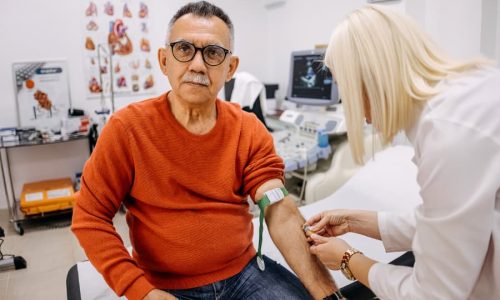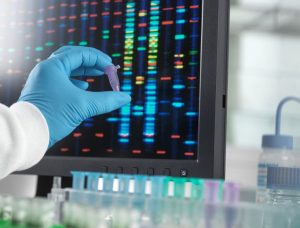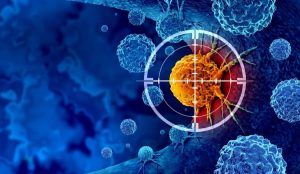
Recognizing Cancer Misinformation: Expert Insights from 2 RCCA Oncologists
“Consider the source.” It’s good advice for dealing with the sting of criticism or the allure of gossip, but two oncologists say it’s even better
HIPAA Alert: Potential Data Breach Learn More
Questions on Oncology, Hematology and/or Infusion Clinical Services due to COVID-19 Crisis – CALL 833-698-1623
Important Information for Our Patients Regarding the Coronavirus.
RCCA Providing Area Cancer Patients with Access to Care During Coronavirus Outbreak
RCCA Offering Patients Virtual Visits During Coronavirus Pandemic
Thanks to ongoing innovation, cancer treatment options are expanding, and more patients are receiving personalized treatment based on their specific type of cancer, as well as their health needs.
One such innovation, chimeric antigen receptor (CAR) T-cell therapy, involves re-engineering a patient’s immune cells to attack and destroy cancer cells. The procedure, in the developmental stages not even a decade ago, now offers hope to many patients with later-stage, difficult-to-treat blood cancers. It generally is used after patients have not had a satisfactory response to prior therapies, or when a cancer that had appeared to be under control or eliminated re-occurs.
This article reviews the role of CAR T-cell therapy in treating cancers of the blood and blood-forming tissues, including B-cell lymphoma, multiple myeloma, and acute lymphoblastic leukemia.

CAR T-cell therapy is a type of immunotherapy. Immunotherapies are formulated to strengthen the immune system, empowering it to identify, attack, and eliminate cancer cells.
T cells are white blood cells integral to the functioning of the immune system. T cells have proteins called receptors that attach to antigens. Antigens are markers of substances that can be harmful to a person’s health. Many antigens denote the presence of substances that originate outside the body, such as bacteria, viruses, toxins, and chemicals. Other antigens are markers of the body’s own tissues and cells, including cancer cells. Each antigen binds with a unique immune receptor, similar to a lock and key. When receptors connect with these antigens, it triggers the immune system to eradicate the foreign substance.
In some cases, T cells, do not have the right type of immune receptor for a particular type of cancer cell. When this is the case, T cells cannot attach to these foreign antigens and kill them. As a result, a cancer can continue to develop unabated. CAR T-cell therapy corrects this problem by modifying T cells to target cancer cells.
A cycle of CAR T-cell therapy can take several weeks, as the process involves:
At the clinic, a technician inserts two intravenous (IV) lines into the patient’s arm. One line is for drawing blood and extracting white blood cells—a procedure called leukapheresis—while the other line pumps blood back into the body. In some cases, doctors use a central venous catheter, which incorporates both IV lines.
The patient sits in a chair or lies in a bed during the procedure, which takes 2 to 3 hours. Leukapheresis may cause a drop in blood calcium levels, leading to muscle spasms or numbness and tingling. Patients may receive calcium intravenously or via oral supplements to offset the loss of calcium.
After removing the white blood cells, the technician separates the T cells from the other types of white blood cells and sends them to a laboratory, where the gene for the chimeric antigen receptor is infused into the T cells. This enables them to attach to specific cancer cell antigens once they are re-introduced to the patient’s body.
The genetic engineering process is intricate and the cells need time to develop in a controlled environment, so cultivating enough CAR T cells for effective treatment may take several weeks. Researchers, however, are investigating ways to expedite the cell engineering process.
Each cancer has a distinct antigen, and each CAR T cell is made for that antigen. The CAR T cells used for treating one cancer will not be the same as those cultivated for treating another type of cancer.
Once enough CAR T cells have been engineered, they are infused into the patient. To prepare for the infusion, a medical oncologist or hematologist may administer chemotherapy to lower the number of other immune cells in the body. This is done to increase the likelihood that the CAR T cells will be effective. Once the CAR T cells are infused, they bind with cancer cells to eliminate those cells.
Initially, CAR T-cell therapies were employed mainly to treat acute lymphoblastic leukemia (ALL), one of the most common cancers in children. Over time, these therapies expanded to treat children and adults with advanced blood cancers such as forms of leukemia, lymphoma, and multiple myeloma. Several CAR T cell therapies are now approved by the US Food and Drug Administration (FDA), offering hope to patients for whom other treatments have proven ineffective.
Medical oncologists and hematologists adhere to rigorous patient-safety standards when administering T-cell therapy and other immunotherapies. In determining whether a person is a candidate for the therapy, they consider the patient’s risk factors and overall health in an effort to minimize the chance of significant complications. Still, as with other cancer treatments, CAR T-cell therapy can cause side effects. Some of the more serious adverse effects include:
Cytokines are chemical messengers that stimulate an immune response. T cells release cytokines. When CAR T cells are infused into the patient, the cells may release large amounts of cytokines into the bloodstream. This increase in cytokines may result in:
In rare but serious cases, CRS is fatal. However, as T-cell therapy has come into wider use, prevalent medical oncologists and hematologists have become increasingly adept at preventing and managing CRS, and in identifying people who may not be good candidates for CAR T-cell therapy because they are at elevated risk for more-severe CRS.
Neurologic problems, sometimes called immune effector cell-associated neurotoxicity syndrome, also can occur with CAR T-cell therapy. Why this occurs in some CAR T-cell therapy patients is unclear, but the potential complications include:
Because of the potential for neurologic effects, adults typically are advised against driving, operating heavy machinery, and similar activities for several weeks after T-cell therapy.
T-cell therapy may also weaken the immune system, leaving patients susceptible to potentially serious infections. Some patients might experience an allergic reaction during the infusion. Others may experience a drop in blood cell levels, causing fatigue and an increased risk for bleeding. T-cell therapy may also decrease blood levels of certain minerals, including potassium, phosphorus, and sodium.
Many side effects of CAR T-cell therapy are treatable. CAR T-cell therapy recipients should consult their doctor as soon as possible if they notice any unusual symptoms.
Traditionally, T-cell therapy has not been recommended for treating blood cancers until the disease has progressed and other treatments have failed. However, extensive research is changing experts’ perspectives on the role of this type of immunotherapy in cancer treatment. Consider these developments shaping the future of T-cell therapy:
Numerous clinical trials are ongoing to determine the efficacy of T-cell therapy for treating more blood cancers and other cancer types. Some of these studies have found that CAR T-cell therapy is an effective second treatment for non-Hodgkin lymphoma (NHL) after an ineffective first treatment. These findings suggest that T cell therapy may replace chemotherapy as a second-line treatment for NHL.
Researchers also are investigating whether T-cell therapy is effective for treating solid tumors. Solid tumors present several challenges that impede T cell therapy, such as:
Medical oncologists and hematologists are exploring techniques to make T-cell therapy more effective in treating solid tumors. For example, one approach involves infusing the body with safe doses of specific molecules, such as types of cytokines, to allow T-cell therapies to withstand the immune-suppressing environment that solid tumors create.
The conventional approach to CAR T-cell therapy is to collect T cells from the patient and infuse them back into the body. As mentioned, this can take several weeks. Accepting T cells from healthy donors can expedite the process, as treatment centers would have a stock of readily available T cells, instead of needing to manufacture them from each patient.
With many clinical trials investigating the role of CAR T-cell therapy in treating other cancers that have progressed or recurred despite initial treatment, patients may want to talk with their oncologist or hematologist about enrolling in one of these studies.
Healthcare organization administering clinical trials must adhere to strict guidelines to ensure patient safety to the greatest degree possible. All trial protocols are overseen by institutional review boards and medical experts. Doctors also obtain informed consent from their patients before those people enter the trial – meaning that they thoroughly educate patients about the l study, including the potential risks and benefits.
All patients should discuss clinical trials with their doctors to determine whether participation is the right choice. Patients may wish to obtain second opinions before exploring clinical trials. Consult a hematologist or oncologist for more insight and answers to any questions.
The hematologists and medical oncologists of RCCA, one of the nation’s largest networks of oncology specialists, are expert in treating blood and solid-tumor cancers, and offer patients access to cutting-edge, evidence-based treatments.
With 22 locations in New Jersey, Connecticut, Massachusetts, and the Washington D.C., area patients can find compassionate, comprehensive cancer care close to home. Contact RCCA to learn more about treatment options or to schedule an appointment.
For more information or to schedule an appointment,
call 844-346-7222. You can also schedule an appointment by calling the RCCA location nearest you.

“Consider the source.” It’s good advice for dealing with the sting of criticism or the allure of gossip, but two oncologists say it’s even better

Biomarker testing is the evaluation of samples of a patient’s tumor, blood, or both to identify the genetic mutations responsible for the development of cancer,

Medical research has made tremendous strides in improving how oncologists understand and treat cancer. One of the most exciting developments is the use of radiopharmaceuticals.

Regional Cancer Care Associates is one of fewer than 200 medical practices in the country selected to participate in the Oncology Care Model (OCM); a recent Medicare initiative aimed at improving care coordination and access to and quality of care for Medicare beneficiaries undergoing chemotherapy treatment.